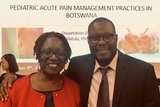

The economic recession of the mid-1970s offered few employment prospects for recent college graduates. Sharon Irving, then a university student, looked to nursing as an opportunity for job stability and security. “At that time, I thought nursing would be a place-holder in my life,” says Irving, PhD, MSN, CRNP, FCCM. “I thought nursing would allow me to start making a living while I figured out what I really wanted to do.”
Shortly after Dr. Irving graduated, she was accepted into the first cohort of the newly-established neonatal care training program at New York-Presbyterian/Columbia University Irving Medical Center. The trainees would spend three months in the neonatal intensive care unit (NICU) and three months in the stepdown unit. For an early career professional, Dr. Irving was very content: she enjoyed the training program, and on her days off, she had plenty of time to explore the city.
Dr. Irving spent a few years living and working in New York as she continued to search for her career calling. Shortly after taking a new position in the NICU at Texas Children’s Hospital, Dr. Irving had the opportunity to care for an infant born at 24 weeks. Amazingly, the preemie was able to eventually transition into stepdown care and ultimately go home with his family. This experience was a pivotal moment in Dr. Irving’s journey, shifting not only her career goals but also her perspective on life.
“That’s when I knew that I wanted to change lives,” - Sharon Irving, PhD, MSN, CRNP, FCCM
Each year after, when the infant’s family sent updates and birthday pictures to the NICU team at Texas Children’s, this passion was reinforced, and Dr. Irving knew that she had finally found her calling.
When Dr. Irving eventually moved on to work in the pediatric intensive care unit (PICU), she discovered that she enjoyed caring for patients with a broad range of diseases, as well as interacting with children of different ages. She followed this growing passion to Pennsylvania, where she ultimately earned her doctorate in nursing at the University of Pennsylvania (Penn).
Now a pediatric nurse practitioner in the PICU at Children’s Hospital of Philadelphia (CHOP) and an assistant professor of pediatric nursing at Penn, Dr. Irving says that she is excited about the future of nursing and the wide expanse of career opportunities available for new graduates. Nurses can specialize, focus on research, or combine these areas of interest. No matter which direction nursing graduates take, however, Dr. Irving believes that a passion for the field is critical to success. “Whether you are a nurse scientist or direct care provider, you have to be passionate about what you do and how you do it.”

Dr. Irving recently served as the dissertation committee co-chair for Dr. Sam Matula, an advanced practice nurse from Botswana, who recently completed his nursing doctoral degree. This experience reinforced Dr. Irving’s belief that nurses are given a unique view into patients’ lives, informing care delivery and enabling them to improve the quality of care not only in hospitals, but across communities, in outpatient settings, schools, and even homes.
“Whether it’s in the home or the clinic, the United States or abroad, nurses are the masters of care coordination,” says Dr. Irving. “They ensure the best possible care is provided to patients and families according to their situations.”
Dr. Irving says she is inspired daily by the patients she meets and the clinical experiences she continues to have. “Nursing can be very challenging, but it is also rewarding. The opportunity to make a difference in a patient’s life is worth the challenge. When your career is your passion, you don’t work a day!”
For Dr. Irving and millions of nursing professionals, this passion translates into a continued quest to improve the health of children all around the world.
Dr. Sharon Irving has no affiliation in any way with New York-Presbyterian/Columbia University Irving Medical Center and did not receive any benefit or compensation from the institution for its mention in this article.
Featured in this article
Specialties & Programs

The economic recession of the mid-1970s offered few employment prospects for recent college graduates. Sharon Irving, then a university student, looked to nursing as an opportunity for job stability and security. “At that time, I thought nursing would be a place-holder in my life,” says Irving, PhD, MSN, CRNP, FCCM. “I thought nursing would allow me to start making a living while I figured out what I really wanted to do.”
Shortly after Dr. Irving graduated, she was accepted into the first cohort of the newly-established neonatal care training program at New York-Presbyterian/Columbia University Irving Medical Center. The trainees would spend three months in the neonatal intensive care unit (NICU) and three months in the stepdown unit. For an early career professional, Dr. Irving was very content: she enjoyed the training program, and on her days off, she had plenty of time to explore the city.
Dr. Irving spent a few years living and working in New York as she continued to search for her career calling. Shortly after taking a new position in the NICU at Texas Children’s Hospital, Dr. Irving had the opportunity to care for an infant born at 24 weeks. Amazingly, the preemie was able to eventually transition into stepdown care and ultimately go home with his family. This experience was a pivotal moment in Dr. Irving’s journey, shifting not only her career goals but also her perspective on life.
“That’s when I knew that I wanted to change lives,” - Sharon Irving, PhD, MSN, CRNP, FCCM
Each year after, when the infant’s family sent updates and birthday pictures to the NICU team at Texas Children’s, this passion was reinforced, and Dr. Irving knew that she had finally found her calling.
When Dr. Irving eventually moved on to work in the pediatric intensive care unit (PICU), she discovered that she enjoyed caring for patients with a broad range of diseases, as well as interacting with children of different ages. She followed this growing passion to Pennsylvania, where she ultimately earned her doctorate in nursing at the University of Pennsylvania (Penn).
Now a pediatric nurse practitioner in the PICU at Children’s Hospital of Philadelphia (CHOP) and an assistant professor of pediatric nursing at Penn, Dr. Irving says that she is excited about the future of nursing and the wide expanse of career opportunities available for new graduates. Nurses can specialize, focus on research, or combine these areas of interest. No matter which direction nursing graduates take, however, Dr. Irving believes that a passion for the field is critical to success. “Whether you are a nurse scientist or direct care provider, you have to be passionate about what you do and how you do it.”

Dr. Irving recently served as the dissertation committee co-chair for Dr. Sam Matula, an advanced practice nurse from Botswana, who recently completed his nursing doctoral degree. This experience reinforced Dr. Irving’s belief that nurses are given a unique view into patients’ lives, informing care delivery and enabling them to improve the quality of care not only in hospitals, but across communities, in outpatient settings, schools, and even homes.
“Whether it’s in the home or the clinic, the United States or abroad, nurses are the masters of care coordination,” says Dr. Irving. “They ensure the best possible care is provided to patients and families according to their situations.”
Dr. Irving says she is inspired daily by the patients she meets and the clinical experiences she continues to have. “Nursing can be very challenging, but it is also rewarding. The opportunity to make a difference in a patient’s life is worth the challenge. When your career is your passion, you don’t work a day!”
For Dr. Irving and millions of nursing professionals, this passion translates into a continued quest to improve the health of children all around the world.
Dr. Sharon Irving has no affiliation in any way with New York-Presbyterian/Columbia University Irving Medical Center and did not receive any benefit or compensation from the institution for its mention in this article.
Contact us
Global Health Center